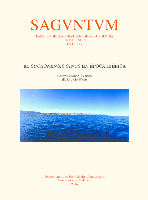
SAGVNTVM-Papeles del Laboratorio de Arqueologia de Valencia
Scope & Guideline
Unlocking the Past: Where Archaeology Meets Innovation.
Introduction
Aims and Scopes
- Iberian Archaeology:
The journal showcases research focused on the archaeology of the Iberian Peninsula, including studies on ancient civilizations, cultural practices, and material culture. - Interdisciplinary Approaches:
Utilizing diverse methodologies, such as cognitive archaeology, neurobiology, and materials analysis, the journal promotes an interdisciplinary perspective in archaeological research. - Cultural Heritage and Identity:
The exploration of cultural heritage through archaeological findings, emphasizing how ancient societies shaped contemporary identities and understandings of the past. - Material Culture Studies:
In-depth analyses of artifacts, including pottery, inscriptions, and structural remains, to understand social practices, trade, and technological advancements. - Funerary Practices:
Research on burial sites and funerary customs, providing insights into the beliefs, social hierarchies, and rituals of past societies. - Historical Contextualization:
The journal emphasizes contextualizing archaeological findings within their historical frameworks to better understand the dynamics of ancient societies.
Trending and Emerging
- Cognitive Archaeology:
The integration of cognitive archaeology, focusing on the neurobiological aspects of human behavior and cognition in ancient societies, has gained traction, emphasizing how mental processes influenced cultural practices. - Material Analysis and Characterization:
There is an increasing focus on the material characterization of artifacts, using scientific techniques to understand production methods and trade networks, which enhances the understanding of ancient economies. - Anthropological Studies:
Research incorporating anthropological perspectives to analyze social structures, cultural practices, and daily life in ancient societies has become more prominent, providing a holistic view of historical communities. - Environmental Archaeology:
Emerging studies examining the interaction between ancient societies and their environments, including climate effects and resource management, reflect a growing interest in sustainability and ecological contexts. - Public Archaeology and Heritage Management:
There is a trend towards exploring the implications of archaeological research for contemporary heritage management and public engagement, indicating a commitment to making archaeology relevant to modern society.
Declining or Waning
- Prehistoric Archaeology:
There has been a noticeable decrease in publications focused specifically on prehistoric archaeology, indicating a shift towards more historical periods and contexts. - Classical Antiquity Studies:
Research centered on classical antiquity, particularly Greek and Roman studies, seems to be less frequent, possibly overshadowed by more localized studies of Iberian cultures. - Generalized Art Historical Analysis:
The trend of broad art historical analyses that do not connect directly with archaeological findings has diminished, suggesting a preference for more integrated studies that combine art with archaeological context. - Thematic Monographs:
Fewer thematic monographs exploring singular topics in depth have been published, indicating a potential shift towards more diverse and varied research outputs. - Regional Studies Outside Iberia:
There is a waning interest in archaeological studies related to regions outside of the Iberian Peninsula, as the journal increasingly focuses on localized research.
Similar Journals

Revista de Historiografia
Empowering historians with a platform for impactful research.Revista de Historiografia, published by UNIV CARLOS III MADRID, INST HISTORIOGRAFIA JULIO CARO BAROJA, is a distinguished open-access journal dedicated to the field of history, fostering rigorous discourse and innovative research since its inception in 2012. With an E-ISSN of 2445-0057 and an ISSN of 1885-2718, this journal provides a platform for historians, academics, and students alike to explore diverse historiographical perspectives and methodologies. As of 2023, it holds a respectable Q4 ranking in the History category and is placed at Rank #896 out of 1760 in Scopus, reflecting its growing impact within the academic community. The journal is based in Madrid, Spain, and offers its contents openly to foster wider accessibility and engagement within the historical discipline. By embracing a broad scope that encompasses various eras and paradigms, Revista de Historiografia is instrumental for anyone seeking to deepen their understanding of historical narratives and methodologies.
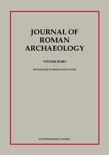
Journal of Roman Archaeology
Fostering Dialogue on the Rich Tapestry of Roman HistoryJournal of Roman Archaeology is a premier academic journal published by CAMBRIDGE UNIVERSITY PRESS, dedicated to advancing knowledge in the fields of archaeology, classics, and visual arts. With its established reputation since 2005, the journal occupies a significant place in the scholarly community, featured in the Q1 quartile in both Classics and Visual Arts & Performing Arts categories, as well as Q2 and Q3 in Archaeology, reflecting its high impact and relevance. The journal not only presents rigorous research but also fosters interdisciplinary dialogue among researchers, professionals, and students across related fields. Although it does not operate under an open access model, it provides essential insights and critical analyses that contribute to understanding Roman archaeological practices and artifacts. With an ISSN of 1047-7594 and an E-ISSN of 2331-5709, the Journal of Roman Archaeology is an indispensable resource for anyone engaged in the exploration of ancient cultures, heritage preservation, and archaeological methodologies.
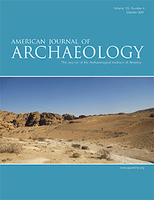
AMERICAN JOURNAL OF ARCHAEOLOGY
Unearthing the Past, Shaping the FutureThe American Journal of Archaeology (ISSN: 0002-9114, E-ISSN: 1939-828X), published by the esteemed University of Chicago Press, stands as a leading scholarly journal in the field of archaeology, celebrated for its rigorous peer-reviewed research. With an impressive impact factor that places it in the Q1 quartile for both archaeology and archaeology within the arts and humanities, this journal ranks among the top 15% in its field, according to Scopus metrics. It serves a global audience of researchers, professionals, and students, facilitating the dissemination of innovative findings from excavations, historical analyses, and methodological advancements. While primarily available through subscription, the journal's archives and features provide invaluable resources for deepening one's understanding of the past and engaging with current archaeological discourse. Operating from its home in Chicago, USA, the American Journal of Archaeology actively contributes to the advancement of knowledge and scholarship in archaeology, making it an essential platform for those invested in the exploration of ancient civilizations and cultural heritage.

Cuadernos de Prehistoria y Arqueologia-Universidad Autonoma de Madrid
Uncovering the Past, Shaping the FutureCuadernos de Prehistoria y Arqueologia-Universidad Autonoma de Madrid is a distinguished academic journal dedicated to the fields of archaeology and prehistory, published by the Universidad Autonoma de Madrid, Departamento de Prehistoria y Arqueología. With an ISSN of 0211-1608, this journal plays a crucial role in disseminating significant research findings and theoretical advancements within these domains. Recognized for its scholarly excellence, it holds impressive quartile rankings in 2023, including Q2 in Archaeology and Q1 in History, reflecting its high impact within the academic community. While currently not an open-access publication, Cuadernos de Prehistoria y Arqueologia provides valuable insights to researchers, professionals, and students engaged in the exploration of human history and cultural heritage from 2018 to 2024 and beyond. With a commitment to fostering interdisciplinary dialogue, this journal serves as an essential platform for innovative studies and comprehensive reviews, contributing to the advancement of knowledge in archaeology and prehistory.
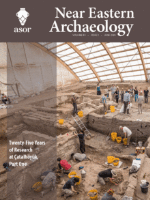
NEAR EASTERN ARCHAEOLOGY
Advancing Knowledge Through Archaeological DiscoveryNEAR EASTERN ARCHAEOLOGY, published by University of Chicago Press, is a premier journal dedicated to the field of archaeology, particularly focusing on the rich cultural heritage and archaeological findings of the Near East. With an ISSN of 1094-2076 and an E-ISSN of 2325-5404, this esteemed publication provides a vital platform for scholars and practitioners to share their research, insights, and discoveries. The journal holds an impressive ranking in the Q1 quartile for both Archaeology and History in 2023, reflecting its significant impact within these fields and a robust history of scholarly contribution. The journal has been pivotal in shaping discussions around archaeological methodology, theory, and contemporary issues from 2002 to 2024, as it continues to reach a wide audience through various access options. With Scopus rankings placing it in the top percentiles for both History and Archaeology, NEAR EASTERN ARCHAEOLOGY represents an essential resource for researchers, professionals, and students alike, fostering the exploration and understanding of the region's archaeological narrative.

Journal of Ancient History and Archaeology
Illuminating the Pathways of Ancient SocietiesJournal of Ancient History and Archaeology is a premier, open-access academic journal published by MEGA PUBLISHING HOUSE since 2014, dedicated to exploring the rich tapestry of ancient civilizations and archaeological discoveries. With ISSN 2360-266X, this journal has made significant strides in the field, achieving elevated rankings across multiple categories, including Q1 in Classics and Q2 in History as of 2023. Positioned in Romania, the journal serves an international audience of researchers, professionals, and students who seek to disseminate and access influential scholarship in ancient history and archaeology. As a prominent resource within the Scopus rankings, it reflects a robust commitment to advancing knowledge through quality research, making it a vital platform for the sharing and discussion of innovative ideas and methodologies. The journal covers a wide array of topics related to ancient societies, enhancing our understanding of their cultural, historical, and archaeological significance.
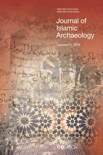
Journal of Islamic Archaeology
Unearthing the Secrets of Islamic SocietiesJournal of Islamic Archaeology is a distinguished publication dedicated to advancing the field of archaeology through the lens of Islamic heritage and culture. Published by EQUINOX PUBLISHING LTD, this journal provides a platform for researchers, professionals, and students to disseminate their findings and engage in critical dialogue regarding the archaeological aspects of Islamic societies from 2014 to the present. With an ISSN of 2051-9710 and E-ISSN 2051-9729, the journal is indexed within significant academic databases and positioned notably in the Q3 and Q2 quartiles for archaeology in the Arts and Humanities and Social Sciences categories, respectively. The journal fosters scholarly exchange and innovation, drawing attention to the rich tapestry of Islamic archaeology, and securing its role as an essential resource for practitioners and academics alike. Its commitment to rigorous peer-review and high-quality contributions ensures a valuable repository of knowledge, enhancing the understanding of an often underrepresented field in archaeology.

Lanx-Journal of the Scuola di Specializzazione in Archeologia of the University of Milan
Uncovering the past, enriching the future.Lanx-Journal of the Scuola di Specializzazione in Archeologia of the University of Milan, published by Milano University Press, is a distinguished platform dedicated to the field of archaeology. Committed to advancing archaeological research and scholarship, this Open Access journal has been available to the global academic community since 2008, facilitating easy dissemination of innovative ideas and findings. With a strong emphasis on promoting interdisciplinary dialogue, the journal covers a wide range of topics from classical archaeology to contemporary practices, making it an invaluable resource for researchers, professionals, and students in the field. Situated in the historic city of Milan, it aims to contribute to the preservation and understanding of cultural heritage through rigorous academic inquiry and collaboration.

Ancient Asia-Journal of the Society of South Asian Archaeology
Unlocking the Secrets of History Through Open Access ResearchAncient Asia - Journal of the Society of South Asian Archaeology, published by ARF India, stands as a pivotal resource for the exploration and dissemination of archaeological research focused on the rich history and culture of South Asia. Since its inception as an Open Access journal in 2006, it has become an essential platform for scholars and enthusiasts alike, boasting an impressive range of quartile rankings across multiple disciplines, including Anthropology, Archaeology, History, and Visual Arts. With expansion into various indexed categories and consistent dissemination of impactful research common to this highly diverse field, Ancient Asia aims to foster interdisciplinary dialogue, facilitate collaboration among researchers, and enhance the global understanding of ancient civilizations within the region. By embracing an inclusive access model, the journal encourages wide readership and engagement, positioning itself as a key player for students, professionals, and academics interested in delving into the archaeological marvels of South Asia.

OLBA
Connecting Scholars to the Legacy of the PastOLBA is a distinguished journal in the field of archaeology, published by Mersin University Publications Research Center Cilician Archaeology in Turkey. With an ISSN of 1301-7667, this academic journal has been a platform for scholarly discourse from 2009 to 2014 and again from 2016 to 2019, with a recent volume published in 2022. Although it is currently categorized in the fourth quartile (Q4) for both Arts and Humanities and Social Sciences within archaeology, OLBA continues to contribute significantly to the global archaeology community. It serves as an essential resource for researchers, professionals, and students interested in the diverse aspects of archaeological studies and cultural heritage. Despite not being an open-access journal, OLBA strives to disseminate knowledge effectively, aiding in the exploration of ancient civilizations and the rich tapestry of human history. Its Scopus rankings, placing it in the bottom percentiles, demonstrate the ongoing need for the community to support and engage with the journal to enhance its visibility and impact in the archaeological domain.